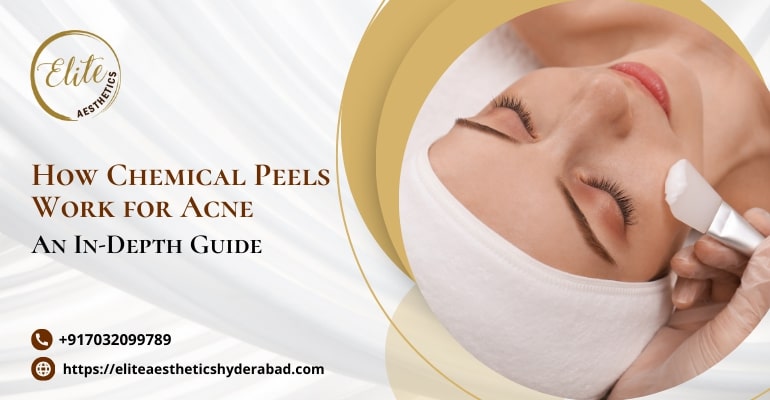How Chemical Peel Treatment Work for Acne: An In-Depth Guide

Understanding Chemical Peels for Acne Treatment
Acne can be frustrating, affecting your confidence and leaving behind scars and uneven skin tone. While there are many treatments available, chemical peels have gained popularity for their ability to rejuvenate skin and treat acne effectively. If you’re considering chemical peels for your acne, this guide will walk you through everything you need to know about how they work, their benefits, and what to expect.
What Is a Chemical Peel?
A chemical peel treatment is a skincare treatment where a chemical solution is applied to the skin to exfoliate its outer layers. This process removes dead skin cells, unclogs pores, and stimulates the growth of new, healthier skin. Depending on the type and depth of the peel, chemical peels can target various skin concerns, including acne, acne scars, pigmentation, and fine lines.
How Do Chemical Peels Help with Acne?
Chemical peels are particularly effective for acne-prone skin. Here’s how they work:
- Exfoliation and Unclogging Pores
- Reducing Sebum Production
- Fighting Acne-Causing Bacteria
- Fading Acne Scars and Pigmentation
- Stimulating Collagen Production
- Superficial Peels
- Medium Peels
- Deep Peels
Acne often occurs when pores are clogged with oil, dead skin cells, and bacteria. Chemical peels exfoliate the surface of the skin, removing impurities and preventing future breakouts.
Many chemical peels contain ingredients like salicylic acid, which penetrates deep into the skin and reduces excess oil production. This helps to control acne at its root.
Certain acids used in chemical peels, such as glycolic acid, have antibacterial properties that help kill acne-causing bacteria.
Acne often leaves behind scars and dark spots. Chemical peels promote skin cell turnover, gradually fading these imperfections and revealing smoother, even-toned skin.
Chemical peels encourage collagen production, which helps improve the skin’s texture and elasticity, reducing the appearance of acne scars.
Types of Chemical Peels for Acne
Chemical peels come in different strengths, and the type of peel recommended depends on the severity of your acne and skin type.
Mild peels using alpha-hydroxy acids (AHAs) like glycolic acid. Great for mild acne, surface-level scars, and brightening dull skin.
Often use trichloroacetic acid (TCA) or stronger AHAs. Effective for moderate acne, deeper scars, and uneven skin tone.
Use powerful ingredients like phenol. Best for severe acne scars but require more downtime and professional supervision.
The Process: What to Expect During a Chemical Peel
Consultation: A dermatologist or skincare professional will evaluate your skin type, acne severity, and goals to determine the best peel for you.
Preparation: You may be advised to prepare your skin with a gentle skincare routine and avoid certain products, like retinoids, a few days before the treatment.
Application: During the procedure, the chemical solution is applied to your skin. You may feel a slight tingling or stinging sensation, which typically subsides quickly.
Peeling and Recovery: After the treatment, your skin will begin to peel over the next few days. This is normal and indicates that the treatment is working. Recovery time depends on the depth of the peel, ranging from minimal downtime for superficial peels to a week or more for deeper peels.
Benefits of Chemical Peels for Acne
- Clearer Skin: Targets active acne and prevents future breakouts.
- Smoother Texture: Reduces the appearance of scars and rough patches.
- Even Skin Tone: Lightens dark spots and pigmentation caused by acne.
- Younger Appearance: Stimulates collagen production for firmer, healthier skin.
Is a Chemical Peel Right for You?
Chemical peels can be highly effective, but they’re not suitable for everyone. It’s essential to consult with a skincare professional, especially if you have sensitive skin, active infections, or severe acne. They can recommend the right type of peel and guide you through the process.
Post-Treatment Care Tips
After a chemical peel, your skin will be sensitive. Follow these tips for optimal results:
- Avoid direct sunlight and use sunscreen daily.
- Keep your skin hydrated with a gentle moisturizer.
- Avoid picking or peeling the skin as it heals.
- Stick to a mild, non-irritating skincare routine.
Chemical peels are a powerful and effective way to treat acne and improve skin health. They address the breakouts, scars, and uneven texture left behind. If you’re ready to achieve clearer skin, consider consulting a professional about chemical peels. This treatment can be a game-changer for your skincare journey with proper care and guidance.
If you are looking for a chemical peel treatment in Kondapur, contact Elite Aesthetics. We prioritize your well-being, ensuring you receive the best and most appropriate care.
